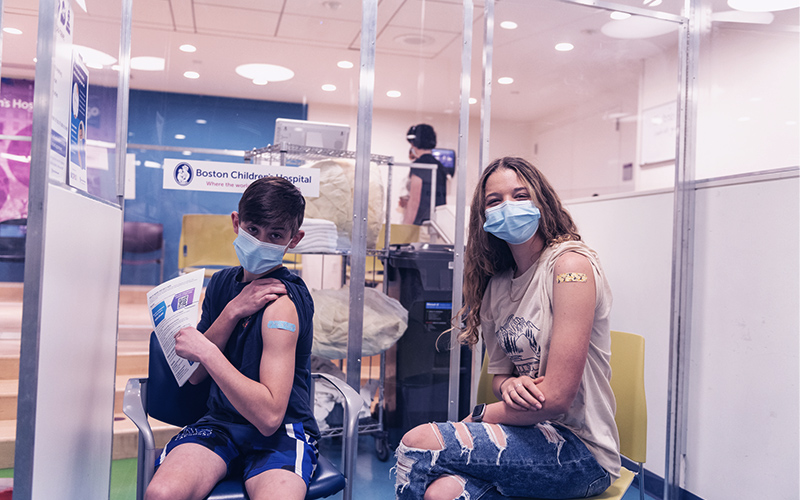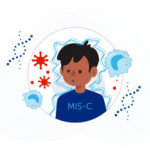Two for one: It’s safe to get COVID and flu vaccines at the same time

Your child can greatly reduce the risk of serious illness by receiving COVID and flu vaccines in one sitting — all they have to do is roll up both sleeves. Now, getting a shot in each arm might give your child pause, but two infectious disease specialists at Boston Children’s Hospital say that a double inoculation shouldn’t be a concern. A recent study by several U.K. universities raised no safety concerns and showed no diminishment of the efficacy — basically, the immune response — of either vaccine.
Is it safe to get COVID and flu vaccines at the same time?
Yes, it is safe to receive both, according to the U.K. study. The study evaluated adults who had received a second dose of the Pfizer vaccine with either a flu shot or a placebo. It found that getting the flu and COVID shots together did not affect immune responses to either vaccine.
And though children were not included in the study, says Dr. Kristin Moffitt, a pediatric infectious disease specialist at Boston Children’s, says parents should find comfort that side effects were generally mild and similar between the groups of adults receiving the COVID shot alone or with a flu shot. The most common side effects were fatigue, muscle aches, and soreness at the injection sites.
It’s also worth noting the flu vaccines used in the U.K. study are similar to the vaccines that will be administered this year in the U.S., Dr. Moffitt says. Lastly, it might be assuring for parents to consider that most children have been receiving multiple vaccinations — including those for bacteria such as pneumococcus and pertussis and viruses such as hepatitis B and influenza — in one sitting since infancy. “There’s a decades-long history of doing that safely,” she says. “So, we’re relying on historical experience, but it’s reassuring at the same time to have a study like this.”
What if my child balks at getting two shots in one sitting?
If they haven’t done so, the opportunity is still there for kids to receive a COVID-19 vaccination, in addition to a flu vaccine, says Dr. Melanie Dubois, a Boston Children’s pediatric infectious disease specialist. If they’re nervous about possible side effects, she says, you can tell your child that any discomfort is only temporary and a sign that the body is working to protect them from the virus.
COVID and flu vaccines can have similar side effects, including local symptoms such as pain, redness, and swelling at the site of the injection, as well as generalized symptoms such as headache, muscle aches, and fatigue. “Ultimately, you’re trying to prevent something more serious,” Dr. Dubois says. “You can tell them it’s an important step to prevent illness from both diseases and keep them healthy.”
When should your child receive the vaccinations?
If they haven’t yet had a COVID-19 vaccination, they can get one now. Dr. Dubois urges parents to get their children vaccinated against the flu as soon as possible. “Time is of the essence. It’s worth getting the shot now to protect ourselves, our family, and our community this fall and winter.”
For more insight and advice about keeping your family safe from COVID-19, visit our “parenting resources” page.
Related Posts :
-

Covid variants 101: What parents should know
First came Alpha, then Beta. It’s all about Delta right now, but Mu is already making headlines. You almost ...
-

Keeping kids emotionally healthy during COVID-19
Children and teens have suffered immensely during the COVID-19 pandemic. Changing school and family routines, isolation at home, illness or ...
-

Why do some children get MIS-C after COVID-19? Some early clues
Several months into the COVID-19 pandemic, a small number of children began to develop a cluster of mysterious symptoms. These ...
-

Five things to know about the flu
It’s flu season again. In fact, about half of every year, from September to March, is “flu season.” Despite ...





